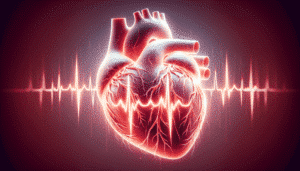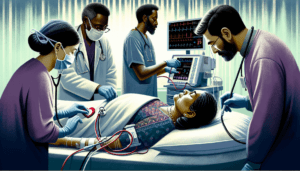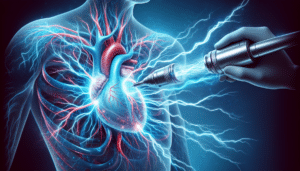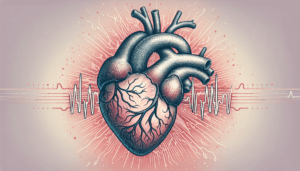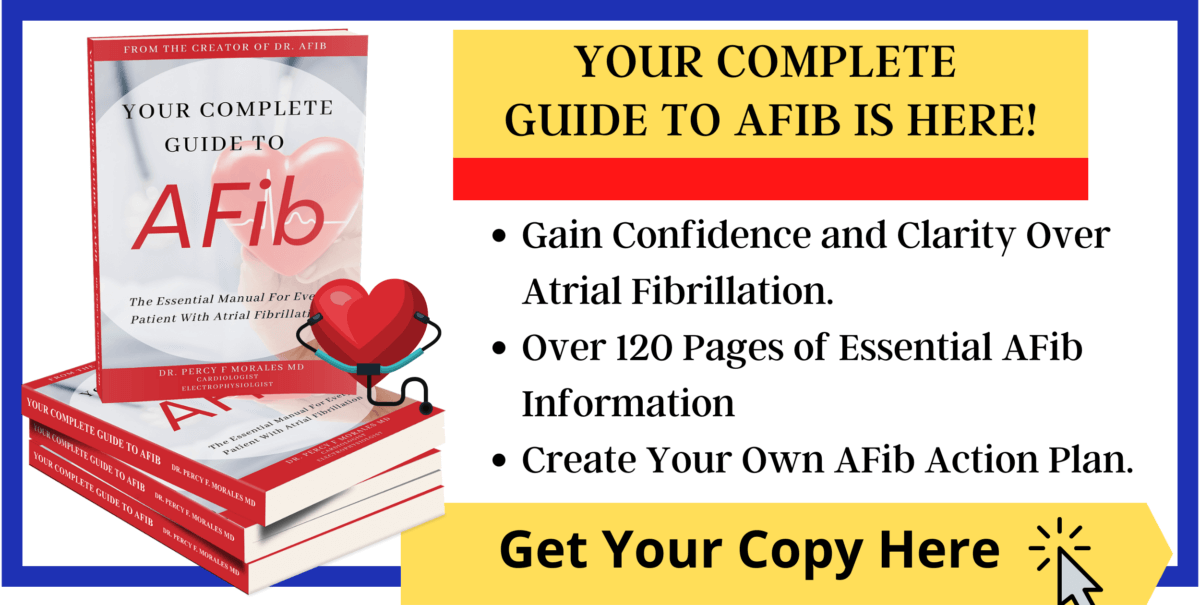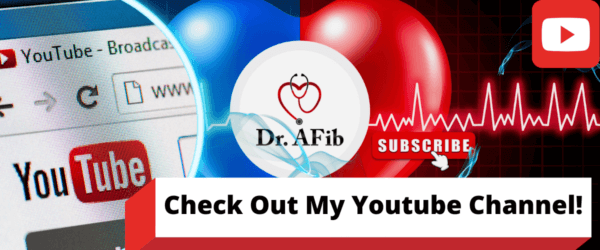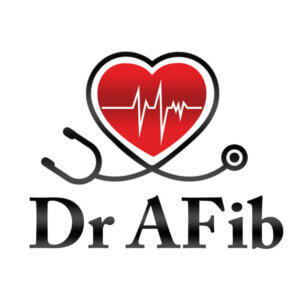Read more about when to go to hospital for AFib in this article. Have you ever caught yourself asking, “when do I need urgent medical attention during an AFib attack?” If so, this article is going to be a great resource for you.
If you or someone you know has been recently diagnosed with atrial fibrillation, the sudden onset of symptoms can be a stressful and frightening experience. While mild AFib episodes can commonly be managed with at-home techniques, it is super important to be able to identify more serious symptoms that require urgent medical assessment and treatment by trained medical professionals.
Here is everything I want you to know about seeking urgent medical attention for an atrial fibrillation attack:
The Most Common Causes of a Rapid Heart Rate
Normally, people have heart rates averaging around 60-100 beats per minute, patients with AFib or other heart conditions can quickly experience resting heart rates of over 120 bpm or much higher with other associated symptoms. The most common causes of rapid heart rates include:
-
Atrial Fibrillation Attacks 一 An AFib episode is one of the most common causes of tachycardia (elevated heart rate). Caused by asynchronous electrical impulses to the atria of the heart, moderate to severe AFib attacks can require urgent medical attention to resolve, and increase risk for stroke.
-
Atrial Flutter 一 Atrial flutter occurs when the heart’s atria beat in a regular rhythm that is faster than the expected normal rate. Atrial flutter symptoms can resolve on their own, but in severe cases may also require medical attention. In addition, atrial flutter also increases risk for stroke, similar to AFib.
-
Ventricular Tachycardia or Ventricular Fibrillation一 The ventricles of the heart are responsible for pushing blood out of the heart to the rest of the body. If the rate and rhythm of the ventricles becomes too fast, such as in ventricular tachycardia or ventricular fibrillation, this can quickly turn into a life-threatening condition. These two conditions frequently require emergent medical attention.
-
Supraventricular Tachycardia 一 Commonly known as SVT, this condition can cause a sudden abnormally fast heart rate involving the upper chambers of the heart. While this condition can sometimes be managed at-home, prolonged episodes of SVT require medical intervention.
AFib Symptoms That Could Require Urgent Medical Attention
Atrial fibrillation can present itself in different ways depending on a person’s medical history and the severity of the episode. It is essential to understand the most common symptoms of atrial fibrillation and to be able identify an AFib attack early before more dangerous symptoms progress. Some of the most common symptoms of an AFib episode include:
-
Tachycardia (a rapid heart rate at rest)
-
Heart palpitations or feeling like your heart skipped a beat
-
Fatigue
-
Dizziness and lightheadedness
-
Chest pain
-
Shortness of breath
It is important to note that some patients with AFib will have an elevated heart rate (usually over 120 bpm at rest) and will experience no symptoms at all. This is why monitoring your symptoms and assessing your personal baseline is essential for identifying the onset of a possibly dangerous AFib attack. If you begin to experience any of these symptoms in a way that makes you feel stressed, uncomfortable, or like you are out of control, that is when seeking medical attention at your nearest emergency room is essential.
Your Complete Guide To AFib: The Essential Manual For Every Patient With Atrial Fibrillation
$15.95 (as of May 24, 2025 06:21 GMT -06:00 – More infoProduct prices and availability are accurate as of the date/time indicated and are subject to change. Any price and availability information displayed on [relevant Amazon Site(s), as applicable] at the time of purchase will apply to the purchase of this product.)When To Go to the Hospital for a Rapid Heart Rate
So, when should someone go to the emergency room for an atrial fibrillation attack? The answer is different for everyone.
For people newly diagnosed with the condition, it is much more likely that they will require medical attention to improve symptoms, and to help ease their concerns and provide education. People living with this condition for longer periods of time are more likely to have plans and strategies to help reduce their attacks, and will be able to better identify more severe episodes.
In many cases, your doctor can give you tips on when urgent medical attention is needed based on your personal medical history, as well as provide tips for at-home management.
As a general guideline for everyone, I recommend that you go to the emergency room for a AFib attack if:
-
You feel short of breath, dizzy, or light headed
-
Any attempt at reducing your symptoms is not successful
-
You feel out of control or stressed
-
You are alone and don’t have anyone around to help monitor your symptoms
-
If you are experiencing chest pain
What Will They Do in the ER to Treat AFib?
A common barrier to people seeking medical attention for an AFib attack is a lack of education about what the medical providers in the emergency room will do to manage their symptoms.
The most common intervention performed in the emergency room for patients with atrial fibrillation is the use of heart rate and rhythm altering medications. These medications will be used to reduce the speed and normalize the rhythm of the heart to reduce the severity of symptoms. The most commonly used AFib medications in the emergency room include:
-
Diltiazem
All the medications above are available in intravenous forms and provide relatively rapid onset of action. Metoprolol, diltiazem, and digoxin are mostly used for heart rate control. Meanwhile, amiodarone has both heart rate and heart rhythm controlling properties. There are pros and cons with the use of any of these medications, and thus, their use needs to be monitored closely.
Your team of medical staff will monitor your symptoms before, during, and after these medications are used to control your episode. Medical testing such as vital monitoring and ECG readings may also be done to evaluate the success of the treatment. In severe cases, a patient may require electrical cardioversion or emergency surgery if their heart rate cannot be normalized and their symptoms are profound.
Can I Control an AFib Attack at Home?
I highly recommend that all people diagnosed with AFib discuss at-home symptom management strategies with their primary provider. During mild attacks, it is possible for a person trained in symptom reducing techniques to manage their symptoms without the need for medical intervention.
Things like regular baseline assessment, heart rate monitoring, and at-home ECG devices can be very helpful for those living with atrial fibrillation. For more information about at-home options for managing AFib, please read my article about four common ways to stop an AFib attack.
In this video I discuss four ways to stop afib attacks at home.
How Improve AFib Attacks Naturally
If you are interested in natural treatment options for atrial fibrillation and are highly motivated in improving your symptoms naturally, to reduce your need for medications or even procedures, then take a look at my one-of-a-kind, online educational program, Take Control Over AFib.
Lifestyle modifications and reducing inflammation are essential components of the long-term management of atrial fibrillation. Addressing the source cause of atrial fibrillation can lead to a significant benefit for most AFib patients. Targeted lifestyle modifications can reduce your symptoms, reduce your reliance on medications or procedures, and even improve the long-term success rate of a catheter ablation procedure for AFib. However, most patients are not given instructions or tips on how to accomplish these essential lifestyle modifications in an AFib targeted style.
This is exactly why I created the Take Control Over AFib Program, to give people a step-by-step plan to improve and potentially reverse atrial fibrillation naturally.
Thinking about lifestyle modifications is easy, but putting in place a system to keep you committed to achieve real results takes time and dedication, and with my step-by-step plan, we can achieve powerful and long-lasting results together.
Learn More About The Take Control Over AFib Program Here
Putting It All Together
At the end of the day, your safety is the most important thing to consider when it comes to seeking urgent medical attention for atrial fibrillation. If you are feeling overwhelmed and unwell, I recommend seeking medical attention as early as possible into your symptoms. Early access to medical treatments can help to provide additional education and can result in treatment options being more successful.
I hope this article has been a helpful resource for anyone living with AFib. Stay safe and be sure to seek urgent medical attention when needed!
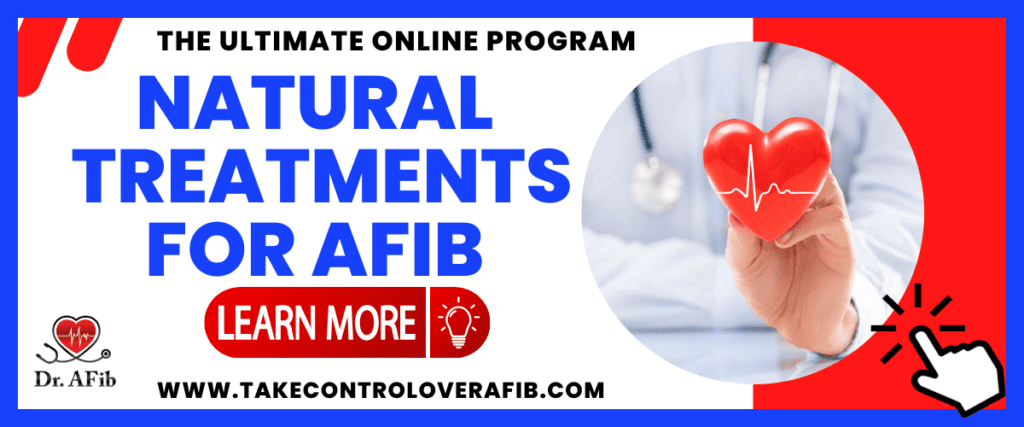
The Best Atrial Fibrillation Book
Your Complete Guide To AFib: The Essential Manual For Every Patient With Atrial Fibrillation
$15.95 (as of May 24, 2025 06:21 GMT -06:00 - More infoProduct prices and availability are accurate as of the date/time indicated and are subject to change. Any price and availability information displayed on [relevant Amazon Site(s), as applicable] at the time of purchase will apply to the purchase of this product.) The A to Z guide on everything you need to know about atrial fibrillation. Written by AFib expert Dr. Percy Morales MD. Over 120 pages of essential information on medications, procedures, and lifestyles modifications for AFib. Easy to read for every patient.
Shop AFib Products on Amazon
KardiaMobile 6-Lead Personal EKG Monitor – Six Views of The Heart – Detects AFib and Irregular Arrhythmias – Instant Results in 30 Seconds – Works with Most Smartphones - FSA/HSA Eligible
20% Off
KardiaMobile 1-Lead Personal EKG Monitor – Record EKGs at Home – Detects AFib and Irregular Arrhythmias – Instant Results in 30 Seconds – Easy to Use – Works with Most Smartphones - FSA/HSA Eligible
$79.00 (as of May 24, 2025 05:29 GMT -06:00 - More infoProduct prices and availability are accurate as of the date/time indicated and are subject to change. Any price and availability information displayed on [relevant Amazon Site(s), as applicable] at the time of purchase will apply to the purchase of this product.)
Apple Watch Series 9 [GPS 41mm] Smartwatch with Storm Blue Aluminum Case with Silver Sport Band M/L. Fitness Tracker, Blood Oxygen & ECG Apps, Always-On Retina Display
(as of May 24, 2025 06:21 GMT -06:00 - More infoProduct prices and availability are accurate as of the date/time indicated and are subject to change. Any price and availability information displayed on [relevant Amazon Site(s), as applicable] at the time of purchase will apply to the purchase of this product.)
Fitbit Sense 2 Advanced Health and Fitness Smartwatch with Tools to Manage Stress and Sleep, ECG App, SpO2, 24/7 Heart Rate and GPS, Shadow Grey/Graphite, One Size (S & L Bands Included)

OMRON 2-in-1 Upper Arm Blood Pressure Monitor & 1-Lead EKG Monitor - Clinically Validated Blood Pressure Arm Cuff & Machine - Use OMRON Connect App
17% Off
Samsung Galaxy Watch 6 44mm Bluetooth Smartwatch, Fitness Tracker, Personalized HR Zones, Advanced Sleep Coaching, Heart Monitor, BIA Sensor, Health Wellness Insights, Big Screen, US Version, Graphite
33% Off
Natural Rhythm Triple Calm Magnesium 150 mg - 120 Capsules – Magnesium Complex Compound Supplement with Magnesium Glycinate, Malate, and Taurate. Calming Blend for Promoting Rest and Relaxation.
$20.77 ($0.17 / Count) (as of May 24, 2025 05:29 GMT -06:00 - More infoProduct prices and availability are accurate as of the date/time indicated and are subject to change. Any price and availability information displayed on [relevant Amazon Site(s), as applicable] at the time of purchase will apply to the purchase of this product.)
Pure Encapsulations Magnesium (Glycinate) - Supplement to Support Stress Relief, Sleep, Heart Health, Nerves, Muscles, and Metabolism* - with Magnesium Glycinate - 180 Capsules
$44.60 ($0.25 / Count) (as of May 24, 2025 06:21 GMT -06:00 - More infoProduct prices and availability are accurate as of the date/time indicated and are subject to change. Any price and availability information displayed on [relevant Amazon Site(s), as applicable] at the time of purchase will apply to the purchase of this product.)
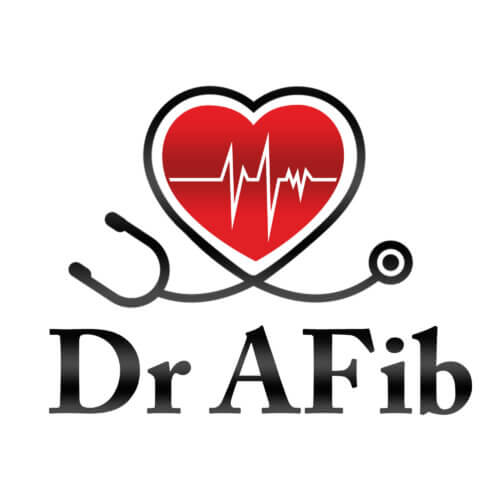
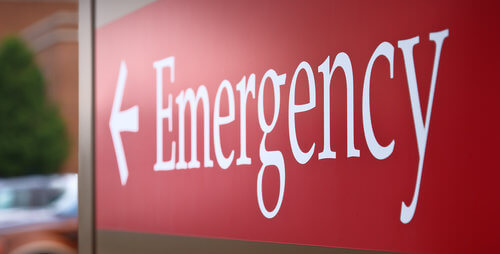














![Apple Watch Series 9 [GPS 41mm] Smartwatch with Storm Blue Aluminum Case with Silver Sport Band M/L. Fitness Tracker, Blood Oxygen & ECG Apps, Always-On Retina Display #1](https://m.media-amazon.com/images/I/311xwtp4mFL._SL100_.jpg)
![Apple Watch Series 9 [GPS 41mm] Smartwatch with Storm Blue Aluminum Case with Silver Sport Band M/L. Fitness Tracker, Blood Oxygen & ECG Apps, Always-On Retina Display #2](https://m.media-amazon.com/images/I/41j+8AaUGsL._SL100_.jpg)
![Apple Watch Series 9 [GPS 41mm] Smartwatch with Storm Blue Aluminum Case with Silver Sport Band M/L. Fitness Tracker, Blood Oxygen & ECG Apps, Always-On Retina Display #3](https://m.media-amazon.com/images/I/41jIyxZitnL._SL100_.jpg)
![Apple Watch Series 9 [GPS 41mm] Smartwatch with Storm Blue Aluminum Case with Silver Sport Band M/L. Fitness Tracker, Blood Oxygen & ECG Apps, Always-On Retina Display #4](https://m.media-amazon.com/images/I/41IpNJERjCL._SL100_.jpg)
![Apple Watch Series 9 [GPS 41mm] Smartwatch with Storm Blue Aluminum Case with Silver Sport Band M/L. Fitness Tracker, Blood Oxygen & ECG Apps, Always-On Retina Display #5](https://m.media-amazon.com/images/I/31o17yhfYpL._SL100_.jpg)






























